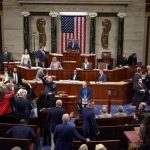Totalitarian British State ends 2012 with flourish of self-sustaining injustice
December 2012 saw the nauseating conclusion to two separate cases where instances of free expression, which were adjudged to have been offensive through the prism of war-death worship (otherwise known as Remembrance), were punished with little regard to what liberty-conscious Americans would call their 1st Amendment rights.
Both cases saw the undeserved and high profile penalisation of individuals – after they had been subjected to a mob with carte-blanche to threaten physical violence. One punishment was by a modern form of pillory with due process having been skipped, and the other by what looked suspiciously like something resembling a mistrial. Neither so-called ‘criminal’ had committed a crime that would be found as such in a real court of law outside of the Banana Republic that is the United Kingdom. Indeed, both cases were clear demonstrations that Britain is a totalitarian state that abuses its legal system in order to perpetuate its survival – to the unashamed detriment of innocents. Both cases were manipulated for the maintenance of public deference for the annual social control mechanism that also harvests support for new illegal war by being conflated with feelings of sympathy for serving armed forces personnel.
38 year-old Jose Paulo Da Silveria was the man who turned up at Bristol’s Remembrance Day parade dressed as a devil and initially had to be protected by police from parade-day attendees who were heard threatening Da Silveria with violence. Given that the ceremony can be seen as a ritualistic re-enactment of mass blood sacrifice to honour and resurrect Nike – the winged goddess who tropes murder by war into something triumphant, and who has sinister connections through mother Styx to the underworld which prompts a comparison with the dragon-like Satan within a Christian context – attendees who were in the know perhaps reacted angrily to an apparent invitation for observers to make connections that are supposed to remain unlinked. However, prosecutor May Lee represented and played down the danger to Da Silveria from the crowd, who were one way or another feeling distressed because their death-worship had suffered an indignity, as ‘a strong reaction to his presence’.
Da Silveria was arrested for an offence under the Public Order Act of using threatening words or behaviour to cause harassment, alarm or distress, and pled guilty even though he seems to have approached the trial believing that he had no intention of committing a crime. After the trial, reporters were told the following:
‘I ran into the middle of this thing and I didn’t realise what was going on.
‘I was going to College Green and I was just skating along.
‘I just came down from Nelson Street and I don’t remember seeing any restrictions and no one was stopping me from carrying on.
‘It was only when I saw the photographs in the newspaper that I realised what was going on.’
Da Silveria’s lawyer described him as being in a world of his own, and as being without any intent to protest the Remembrance event. Indeed, all the stated evidence suggests that a trial would not necessarily have established that Da Silveria’s was guilty of intending to harass or cause distress to the war-death worshippers at the Bristol Remembrance parade. Moreover, given that at the time of the event Da Silveria was in a window where he had stopped taking medication for psychiatric problems, there are undoubtedly questions to ask as to whether Da Silveria is not in fact an innocent individual who, for whatever reason but his own intent to cause a problem, was at the wrong place at the wrong time and whose vulnerability was then taken advantage of in order to stage a show-trial (that never was!).
In the second example of injustice, after burning a poppy and uploading an image of the act allegedly along with an abusive dedication to serving armed forces personnel, 19 year-old Linford House was subjected to an online ‘hate-campaign’ (seemingly instigated and perpetrated by the English Defence League, who, in their disregard for free speech, are increasingly looking like a group in the pay of the Establishment to generate public support for the hoax that is the ‘War on Terror’) and even had to be moved from his house supposedly for his own safety. If somewhat misdirected in his statement in terms of who he thought he would be attacking by burning a plastic poppy, Linford House was nevertheless not guilty of a crime; instead, his was a valid expression of free speech. Rather than call for British servicemen to ‘burn in hell’ – hence to call for death – which is what Emdadur Choudhury did in 2010 when he got in trouble for burning a poppy (an associate who also faced trial had to be released due to a lack of evidence), Linford House was merely alleged to have captioned his image with the words: ‘How about that you squadey [sic] ****s’. Even if the allegation about the captioning is true (House seemingly took the image down before trustworthy verification could be made), and although ‘squaddies’ in general are labelled with an apparently offensive term, no individual is targeted, and soldiers are likely to have heard worse from a drill sergeant.
Once again, if the case had received a proper hearing in court – this time after a charge under the Malicious Communications Act – it is not entirely certain that Lindford House, if properly advised and arguing his birthright of free speech, would have been successfully prosecuted.
Perhaps this is why the Crown chose to forego a trial, and House was persuaded to submit himself to a process called ‘Restorative Practise’ which seems, at least in House’s case, to involve re-education through a process of humiliation. Indeed, it seems entirely likely that police relied on bad advice (supplied by a conspiring defence lawyer?), House’s youth and resultant naivety, and the threat of a criminal trial to force him to admit his guilt by meeting and apologising to veterans, current military personnel and a war widow.
House’s experience of ‘restoration’ was not a private affair; it was captured by corporate-media and received lots of exposure. Naturally, the conclusion to make is that the experience was not for House’s benefit, but for the benefit of the corporate-media audience who were supposed to form a connection between the feelings of armed forces personnel and their families, and dissent against Remembrance (which is, even if the protester doesn’t realise it, dissent against the Establishment’s ability to exploit the public in order to manufacture support for war). Such a connection is supposed to generate self-censorship.
Keen to exploit the war widow, the Daily Mail quoted Nikki Scott, whose husband Corporal Lee Scott of the 2nd Royal Tank Regiment was killed in Afghanistan on 10 July 2009, who said:
My family and I learned the hard way about what a poppy means and stands for and when I saw the picture [of the burning poppy] I was hurt, upset and disgusted.
Happy enough not to expect an apology from the Queen, whose private army it was that facilitated the murder of her husband, Mrs Scott went on to say:
It was good to see Mr House talk to us and apologise and hopefully he will be able to go someway to making up for some of the offence he caused.
Linford House’s re-education seemed to be a public success; he was cited in the same article repeating what looks suspiciously like a talking point fed to him to repeat:
The poppy is a symbol of peace and I shouldn’t have done what I did. I’m sorry to everyone that it’s offended.
In fact, the poppy is a symbol of pagan sacrifice and should be offensive in a Christian country (demonstrating that Marxist Britain is no longer one of those things). Being of the same colour, it represents blood that is spilt into the soil, which then becomes fertilised and sends forth plant life – the process is summarised in the scarlet bloom that actually appeared on the battle fields of World War I after the slaughter, thus fixing the association.
Many ancient and Mesoamerican creation myths tell of how the land first consisted of the dismembered body parts of a slaughtered goddess who thereafter demands blood sacrifice to repay for her own, and as a price for the production of essential crop harvests.


















